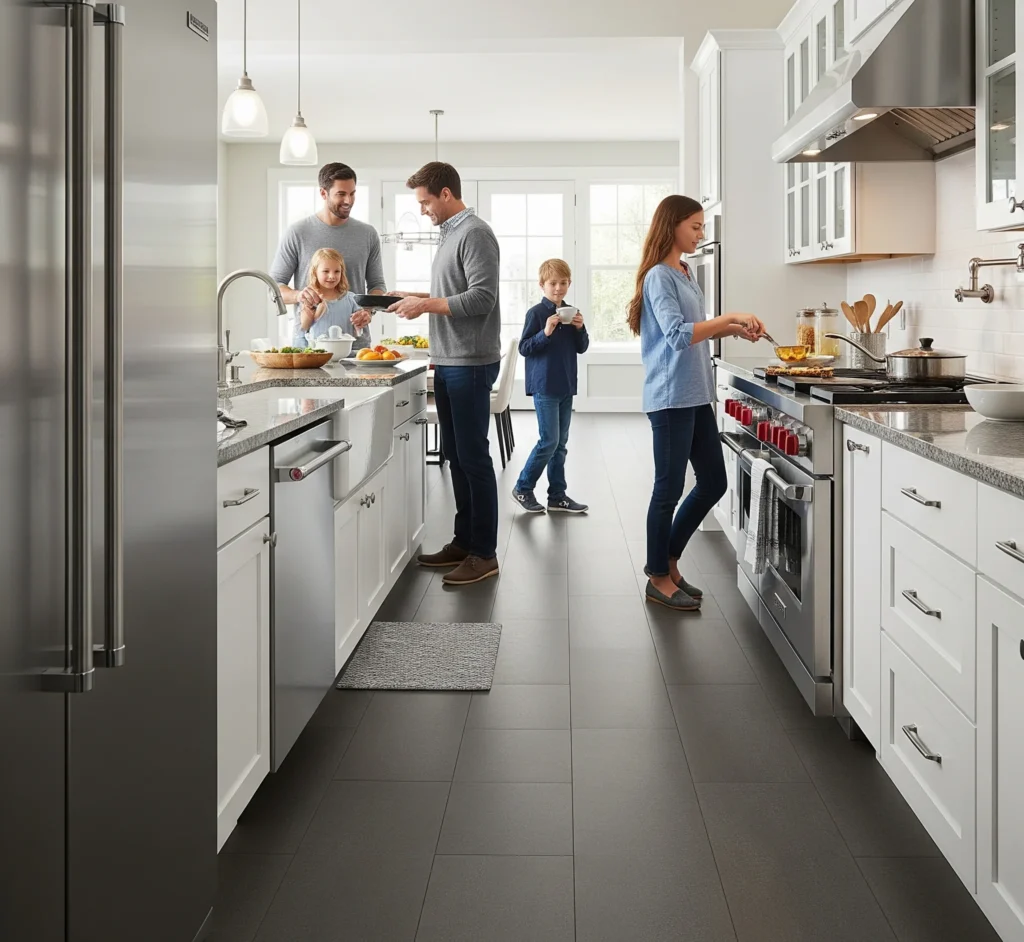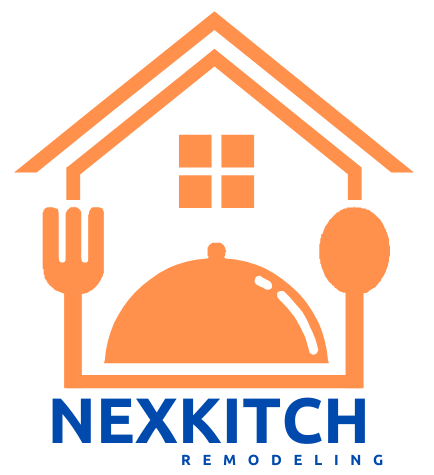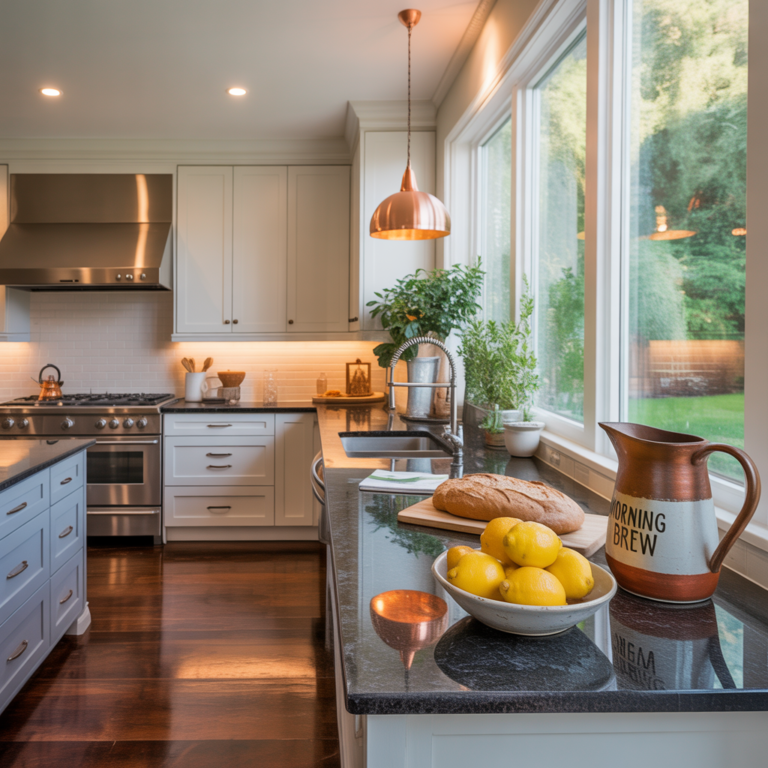Most Durable Flooring for Busy Kitchens That Lasts for Years
If your kitchen feels like Grand Central Station—with kids, pets, and constant foot traffic—then picking the right flooring isn’t just about looks, it’s a survival strategy.
You need something that can take a beating, clean up fast, and still make the space feel fresh. That’s where the most durable flooring for busy kitchens that lasts for years comes into play.
Materials like porcelain tile, luxury vinyl plank, or sealed concrete strike the perfect balance between strength, style, and practicality.
They hold up over time, require minimal upkeep, and won’t break the bank.
Choose wisely now, and you’ll have fewer headaches later—and a kitchen floor that works just as hard as you do.

Why Durability Matters in Kitchen Flooring
The kitchen takes more hits than any other room—foot traffic, spills, heat, and dropped pans all come with the territory. If your floor can’t keep up, it quickly becomes a costly, time-consuming headache.
Durable flooring solves that. It stands strong against scratches, water, and wear, saving you from frequent repairs or replacements that can run $1,500–$4,500.
Think of it this way: the right floor won’t just look good—it’ll work hard, last long, and make your everyday life a whole lot easier.
Luxury Vinyl Plank (LVP) & Tile (LVT)
If you’re after flooring that can take a beating and still look sharp, LVP and LVT are hard to beat. These options offer the visual appeal of wood or stone—without the worry. They’re fully waterproof, resist scratches like a champ, and are comfortable underfoot, making them ideal for kitchens that see daily action.
Why homeowners love it:
- Waterproof core – Spills, splashes, and steam are no match.
- Scratch-resistant wear layer – Stands up to pets, shoes, and dragging chairs.
- DIY installation – Click-lock systems save time and labor costs.
Practical trade-offs:
- Cost: Typically ranges from $2 to $7 per sq ft, making it budget-friendly.
- Lifespan: Holds up well for 10–20 years, depending on quality and maintenance.
- Feel: Softer than tile but not as warm as cork or linoleum.
For busy households, LVP and LVT strike a solid balance between durability, style, and ease of upkeep. They’re tough where it counts—and forgiving when life gets messy.
Key Durability Factors for Kitchen Flooring
When it comes to busy kitchens, durability isn’t just a buzzword—it’s essential. Focus on these core traits:
- Scratch & Impact Resistance – Handles dropped pans, pet claws, and daily wear.
- Water & Moisture Protection – Prevents warping, swelling, and mold.
- Slip & Stain Resistance – Safer footing and fewer permanent messes.
- Easy to Clean – No special cleaners—just mop and go.
- Comfort Underfoot – Softer, warmer options reduce fatigue during long kitchen sessions.
Choose flooring that works as hard as your kitchen does explore our flooring installation services to get started with a solution built to last.
🍽️ Best Kitchen Flooring Options Compared
🏺 Porcelain & Ceramic Tile
✓ Pros: Durable, water-resistant, endless styles
⚠ Cons: Cold underfoot, grout maintenance
Best for: Long-term durability & custom designs
✨ Luxury Vinyl Plank/Tile
✓ Pros: Waterproof, scratch-resistant, DIY-friendly
⚠ Cons: Shorter lifespan, may fade
Best for: Families & pet owners
📄 Sheet Vinyl
✓ Pros: Seamless, budget-friendly, cushioned
⚠ Cons: Susceptible to damage
Best for: Budget-conscious homeowners
🪨 Natural Stone & Terrazzo
✓ Pros: Timeless, long lifespan, unique
⚠ Cons: Requires sealing, slippery
Best for: Luxury kitchens
🌳 Hardwood (Engineered & Solid)
✓ Pros: Classic look, adds value
⚠ Cons: Water-sensitive, high maintenance
Best for: Controlled moisture areas
🌱 Cork & Linoleum
✓ Pros: Eco-friendly, soft, quiet
⚠ Cons: Can stain, needs sealing
Best for: Eco-conscious homeowners
🏗️ Sealed Concrete
✓ Pros: Indestructible, modern look
⚠ Cons: Hard surface, professional install
Best for: Ultra-low maintenance
Choosing the Right One for You
Your ideal kitchen floor depends on how you live, what you value, and how long you want it to last.
👨👩👧👦 Lifestyle Fit
- Kids or pets? Go with waterproof, scratch-resistant options like LVP or tile.
- Elderly at home? Softer, slip-resistant floors like cork are safer.
- Home chef? Choose cushioned surfaces to ease fatigue.
💰 Budget vs Lifespan
| Flooring | Cost/sq ft | Lifespan |
|---|---|---|
| Porcelain Tile | $3–$10 | 50+ yrs |
| LVP / LVT | $2–$7 | 10–20 yrs |
| Engineered Wood | $4–$10 | 20–30 yrs |
| Sheet Vinyl | $1–$5 | 10–15 yrs |
| Cork / Linoleum | $3–$8 | 15–25 yrs |
Longer-lasting floors may cost more upfront but save money over time.
🏡 Style & Resale
- Tile, stone, and wood boost home value.
- Quality vinyl offers style on a budget.
- Light tones brighten space; dark tones hide dirt.
Choose the floor that fits your life today—and still makes sense years down the road.
Care & Maintenance Tips
Even the toughest floors need a little love to stay looking sharp. Regular care not only extends the life of your flooring but also keeps your kitchen safe, clean, and comfortable.
🧼 Daily Basics
- Wipe spills quickly to prevent staining or water damage, especially on wood or stone.
- Sweep or vacuum daily to avoid grit scratching the surface.
- Use pH-neutral cleaners—harsh chemicals can break down finishes over time.
🔁 Periodic Upkeep
- Grout lines (tile): Seal every 1–2 years to block stains and moisture.
- Sealed floors (concrete, cork, wood): Reapply sealant or finish as recommended—usually every 3–5 years.
- Hardwood: May need occasional refinishing, especially in high-wear spots.
👣 Comfort Boosters
- Add anti-fatigue mats in prep zones and in front of the sink.
- Radiant heating under tile or concrete helps combat cold, hard surfaces and adds luxury during colder months.
A bit of routine care goes a long way—helping your floors last longer, feel better, and look cleaner with less effort.
Local Trust Boosters: Greensboro, NC
Flooring decisions aren’t just about materials—they’re also about your local environment, labor market, and trusted providers. For homeowners in Greensboro, a few key factors can make a big difference.
💵 Regional Price Insights
- In Greensboro, expect to pay:
- $3–$6/sq ft for quality LVP or sheet vinyl
- $7–$12/sq ft for porcelain tile, depending on style and labor
- $8–$14/sq ft for natural stone or engineered hardwood
Local pricing tends to run slightly below national averages, making upgrades more accessible.
🛠️ Recommended Local Installers
Look for licensed pros with strong reputations in kitchen remodels and flooring:
- Nexkitch Kitchen Remodeling – Trusted local expertise for full kitchen transformations, including flooring.
- Floor & Decor – Greensboro – Broad selection and design support.
- Master’s Touch Flooring – Known for detailed tile, wood, and vinyl installs.
Always check reviews, request local references, and ask about warranties or material sourcing.
🌡️ Greensboro Climate Tips
With warm, humid summers and fluctuating temps in winter:
- Choose moisture-resistant materials like tile or LVP to prevent warping.
- Avoid unsealed hardwood, which can expand and contract with humidity swings.
- Consider underlayment or radiant heat if installing concrete or tile—winters here can surprise you.
Choosing the right floor for Greensboro’s climate and cost range helps your investment last longer and perform better—without the seasonal headaches.

